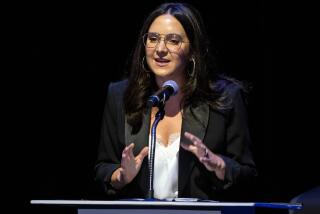‘Free Love’ Still Rules at Swingers Convention
- Share via
LAS VEGAS — Newscasts and talk shows are filled daily with warnings about AIDS and the dangers of “unsafe” sex. Some single women are carrying condoms in their purses. And one in five Americans say the threat of AIDS has dramatically altered their lives.
To some, it might seem like the end of the Sexual Revolution. But to the more than 1,000 people who gathered at the Hacienda Resort and Casino here last weekend, the party is hardly over.
They were members of the North American Swing Club Assn., a group devoted to what in the ‘60s was called “free love” and what in the ‘80s might seem to many to be distinctly hazardous to one’s health.
50% Fewer Are Active
Since AIDS became an issue, admitted Robert McGinley, a Californian and president of the group, participation in swinger groups has been down about 50% among what he estimates are 3 million active swingers in the United States.
But he and others say there actually has been an upsurge in membership in the last four to five months, and McGinley’s message to the convention was that swingers are at little risk of contracting the disease. “The threat is through intravenous drug use, not sex,” he wrote in a brochure that circulated throughout the convention.
That advice would dismay many public health officials. Dr. Martin Finn, medical director of the AIDS program for the Los Angeles County Department of Health Services, said swingers are viewed as a high-risk group for AIDS because they engage in sex with many partners. “I’d certainly be very interested in sending them some literature,” he said of the convention.
And some of the convention’s participants, particularly women, were critical of McGinley for what they said was his understating of the risk of AIDS to women.
But, while convention exhibitors were busy hawking sex toys and explicit publications, white-coated lab technicians offering blood tests for the AIDS virus at one booth passed the time idly. By noon Saturday, they reported, only one convention-goer had paid to have his blood tested for the virus.
“We’re simply talking about social sex, and the world has always had social sex,” said McGinley, who lives in Orange County. “No matter what happens, you cannot stop the human need for sexual expression.”
A trio of women employees of the convention center stole furtive glances at the crowd as they typed--first names only--convention name badges.
One of the typists said she was shocked by the nature of the event, but she smiled as she said it.
Swinging causes uneasiness among “straight” people, McGinley said, because by their very existence they assert that there is more than one way to be married. “It’s not the sex per se, it’s the options that scare the hell out of people,” he said.
Marriage and family therapist Hugh Wallace, a speaker at the convention, said he believes, like McGinley, that swingers are quietly fomenting a social revolution.
The old-fashioned idea of marriage was that it had to be permanent and sexually exclusive, said Wallace, who lives in Riverside. As a society, we’ve discarded the notion that marriage is permanent; infidelity and serial monogamy are cultural norms, he said.
Swingers say they don’t believe in infidelity; they advocate the pursuit of sexual variety in an above-board manner. They contend that couples pursue outside-marital satisfaction together as a function of their marriage rather than for sexual variety.
For this reason, Wallace believes, swinging is really a healthier option than serial monogamy or adultery--it preserves the marriage unit.
On the day she was wed 30 years ago, Lora Minor took her husband Orval as her first and only mate; that was the way women were expected to do things in those days.
The arrangement was satisfactory for a time, she said, but six or seven years ago, when the couple’s three children were grown, Orval Minor said he began to think it unfair that his wife had never slept with another man.
So, according to the Minors, they went looking. They weren’t looking for an affair, they said, they were looking for sex to supplement their marriage, and they found it in swinging.
“I consider this recreation,” said Lora Minor, 52. “It has nothing to do with our relationship as husband and wife.”
Nonetheless, Minor said she carries condoms with her at all times. “I’m very careful,” she said.
While there were some single swingers with dates at the convention, most of the participants were married couples of a conservative demeanor. Most ranged in age from late 30s to 50s.
The married swingers said swinging cannot save a bad marriage; a marriage needs to be solid before a couple enters the “life” so both parties are able to handle the emotional upheaval and insecurities that new swingers experience.
And the “life” is hardly an unstructured free-for-all. Swingers say they devote plenty of time to finding the right partners. So there were sessions on protocol (“How does a swinger say no?”) and etiquette. Among the more mundane do’s and don’ts for partying: Always carry an overnight bag; and be considerate of your hosts.
Other rules are covert. “Male bisexuality has never been big,” McGinley said. “It was tolerated. Now (because of AIDS) it’s not tolerated.”
McGinley maintains that swingers are not at risk for AIDS because they are not drug users and they are not male bisexuals. (Intravenous drug users and male homosexuals and bisexuals are two of the groups at highest risk of contracting AIDS.)
The newsletter--”Playcouple”--that McGinley puts out has made mention of a case in which a Minnesota physician persuaded the members of a swing club to submit to an AIDS antibody test. Of the 156 people tested, two of the women tested positive.
The club disbanded; other clubs followed suit; and there was “all kinds of havoc” in the swing world because of the incident, McGinley said. But he points out that the women who tested positive admitted to having sex with two bisexual men, visitors from San Francisco. McGinley’s implication is that no one within the club was responsible.
Some female swingers say McGinley understates the risk to them. A Sacramento woman named Nancy, who’s been a swinger for eight years, said, “I feel we are at risk. When herpes was a big thing, McGinley downplayed that too.”
Kathy Kennedy, a Cleveland, Ohio, writer who reports on swing clubs for several magazines, estimated that only about 40% of swingers practice safe sex.
“Don’t tell me some of these guys aren’t bisexual,” she said, surveying the room. “Any woman in this room having anal sex unprotected is asking for trouble.”
A young non-swinger said she was at the conference with her boyfriend only to observe a very different way of life. She gave her first name, Sybil.
Sybil said she was angered by the denial of the AIDS threat among most of the swingers she’d talked to. She attended a panel on women and swinging and the topic of AIDS was never mentioned, she said.
In addition to the grave threat of AIDS, Sybil said that from what she had learned about swinging at the conference, it seemed to be a life style that could cause a great degree of emotional distress.
In an encounter, swingers say people are judged almost purely on sexual desirability. Women who looked like Sybil had no shortage of attention at the gathering. Women--and men--who were less stunning were likely to be rejected a time or two.
As Sybil observed, all the rejection and unhappiness experienced in courtship in the straight world is here multiplied by many times because of the number of encounters.
“How many people here are going to get hurt tonight?” Sybil wondered aloud.
More to Read
Sign up for Essential California
The most important California stories and recommendations in your inbox every morning.
You may occasionally receive promotional content from the Los Angeles Times.













